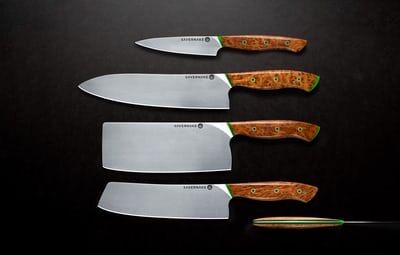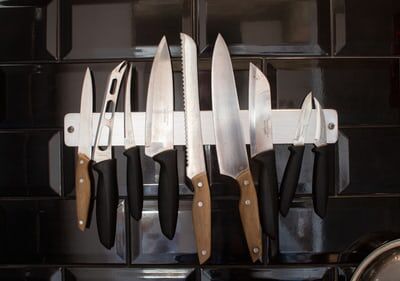
Knives are incredibly versatile pieces of equipment that are used in many different areas other than just cooking. Even within the kitchen, these knives can have different roles as different types are designed to do particular things. You can even find a knife to help you cut down a tree or one that can help you dig a hole in the ground.
It depends on what you are looking to do with the knife and what your situation permits. Pocket knives are one of the best all-around knives that can be great cooking assistants and even self-defense weapons. If you are ever stuck and unable to gauge which knife to use for your situation, this guide will offer some help.
1. Types Of Knives
We are going to focus on kitchen knives since there are far too many general-use knives to cover. In a chef's arsenal, you will usually find a paring knife, a chef's knife, a bread knife, and a cleaver. These are the most basic and most common, though there are many others that are for particular purposes and some which are variations of the most frequently used knives. If you are looking for a general-purpose knife that can help you with everything around the kitchen, a petty knife is a great option. If you need to do something particular like fillet a bone-in piece of meat, a deboning knife will be a better option.
2. Traits Of Knives
Even for one specific type of knife, such as a chef's knife, you will find many different versions, all offering slightly different options that make them better suited to specific tasks. One significant difference is the construction material that is used in a knife. It can be tough to decide on the vg10 steel vs. s30v steel when looking for the best option for the knife's blade. The blade material is also one of the significant factors contributing to the price of a knife; certain metals can be costly. Knives also have different aesthetics, some using standard materials such as durable plastic, making them great for commercial use. In contrast, some are made with ivory handles, which are more suited to display pieces than actual work knives.
3. Purpose Of Each Type
Some differences in knives, such as the handle material, can be entirely aesthetic; other things are for a purpose. For instance, many people may think that a beef knife is curved simply for looks, but this design is essential when cutting meats to ensure the meat isn't torn or shredded by the blade. This is why you should have the right knife for the job, but one thing which is essential for any knife is how sharp it is and how well the blade can maintain its sharp edge. One of the enormous benefits of having high-quality steel blades is that while they are difficult to sharpen, they get incredibly sharp and can maintain that fine edge throughout many use.
4. Your Situation
Sometimes it's just not possible to use the knife you want, nor should you, and sometimes the knife you are using won't do the job no matter how skillful you are. Certain situations require on-the-fly solutions. For instance, if you are going camping, it might be more of a hindrance than a convenience to use a full-sized chef's knife when you don't have a cutting board to cut on. Similarly, if you need to cut open an oyster, no matter how skilled you are, there is little chance that you will be successful with a bread knife. There is a much higher chance that you will hurt yourself and fail to get the job done in this situation.
5. Price
There are cheap knives, and then there are costly ones, even within usable everyday knives. As a home cook, you might not realize the value of these expensive knives, but if you use one, you will understand why chefs are so serious about their knives. While the prices can vary a lot, you will often get what you pay for when it comes to knives.

Whether you are looking to buy a knife for a specific purpose or want to buy an everyday knife that you can use around the kitchen, make sure it can maintain. Purchasing a high-end knife is not just about the blade itself; you also need to know how to properly sharpen and maintain your knife to get the most value from it.




(0) comments
We welcome your comments
Log In
Post a comment as Guest
Keep it Clean. Please avoid obscene, vulgar, lewd, racist or sexually-oriented language.
PLEASE TURN OFF YOUR CAPS LOCK.
Don't Threaten. Threats of harming another person will not be tolerated.
Be Truthful. Don't knowingly lie about anyone or anything.
Be Nice. No racism, sexism or any sort of -ism that is degrading to another person.
Be Proactive. Use the 'Report' link on each comment to let us know of abusive posts.
Share with Us. We'd love to hear eyewitness accounts, the history behind an article.